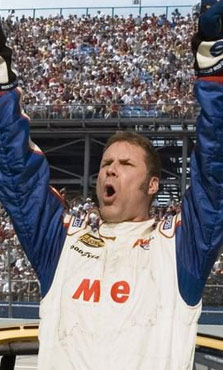
Adam McKay’s “Talladega Nights: The Ballad of Ricky Bobby” follows the winning formula of his previous collaboration with Will Ferrell, the sparkling “Anchorman: The Legend of Ron Burgundy”, by throwing his leading man into a series of comic sketches loosely tied together by a low-brow but ambitious plot. Since SNL, Ferrell has become a kind of comedic comfort food. Yet to be bitten by Tom Hanks’ “serious thespian” bug, Ferrell is still in that golden era of a comedian’s career in which the humor still seems effortless, the creative wellsprings bottomless. Secretly he probably has a pet dramatic project in his sights—“The Ned Beatty Story” perhaps—but thankfully he hasn’t felt much of a need to prove his acting chops just yet. He knows what he’s good at and he sticks to it. Long may he scarper about in his underpants.
This is not to say that “Talladega Nights” is all that good, however, merely that Ferrell himself is compulsively watchable. His star appeal is enough to push past the roadblocks thrown up by the underwritten screenplay, which places too much emphasis on physical gags. While this outing crackles with a few great jokes here and there, the film isn’t as consistently funny or inventive as “Anchorman”. Ferrell’s speed-obsessed redneck, complete with pathetic family history involving a deadbeat dad and duplicitious wife, comes across as a passive victim, a far cry from the gloriously unreconstructed womanizer Ron Burgundy. This NASCAR driver is often too benign for his own good. He’s at his funniest when he seems deeply driven by a feral instinct for sex and other visceral pleasures, and we do get some amusing scenes in which his need for speed leads him into some spectacular crashes, literal and figurative (though oddly the best scene of all is when he steals his mother’s car while she’s buying milk, and that’s with a young actor playing the part).
Sacha Baron Cohen sneers and sighs his way through his first major film role in America as the French Forumla One driver seeking Ricky Bobby’s NASCAR throne. Cohen plays the role enthusiastically, but as funny as his lusty attraction to Ricky is, there’s little inventiveness at work. Drinking a mochiatto behind the wheel to suggest the effeteness of Frenchmen is witless. The clash between the backward Americans—Fox News, NASCAR, Deep South, junk food—and the snooty French racing team—existentialism, effeteness, cowardliness, homosexuality—is low-hanging fruit. The only real fun McKay squeezes out of the chemistry between Ferrell and Cohen comes from the clichéd device, so common in hyper-competitive testosterone movies, of the secret attraction that two otherwise bitter rivals feel for each other. When the two drivers square shoulders and trade insults, lips inches away from a full smooch, they recall Maverick and Iceman from “Top Gun”.
Otherwise it’s mostly safe-as-houses comedy. “Anchorman” knew where the jugular was at all times and zeroed in on it with surgical precision, but “Talladega Nights” is all blunt edges. The best scene in the movie shows the Bobby family at the dinner table, ready to eat piles of sponsors’ junk food like KFC and Domino’s, while Ricky says grace (“sponsored by Powerade”) and thanks “magic baby Jesus”. Southern white trash, pseudo-Christianity, and greedy corporations are skewered nicely, no small thanks to the game John C. Reilly. Another inspired gag: when Ferrell sticks a knife in his thigh to prove he’s paralyzed, the sudden pain in his legs is funny, if a tad obvious. Then one of his crew jabs a second steak knife into the wound to “pry the first one loose” and the scene soars. Just these kinds of bizarre, random jokes elevated “Anchorman” to great heights, but they’re mostly absent in “Talladega Nights”.
The underwhelming ensemble didn’t help. Ferrell is best playing off of strong supporting actors. His doofus act works best when he’s surrounded by simpletons and lunatics who make him, by default, the smartest guy in the room. Steve Carril and the other guys in “Anchorman” gave him a team of brilliantly daft foils. Here, Reilly shines as Ricky’s number two man—literally, since Ricky never lets the poor guy win a race—but he is never allowed the freedom to be sufficiently absurd. Nor is Cohen. He is too inscrutably “French” (though it’s a credit to Cohen’s acting skill that what ought to be a caricature actually seems three-dimensional). Andy Richter is wasted as Cohen’s lover, although he has an excellent vignette as a dog trainer. Ricky Bobby’s sons steal a few scenes as foul-mouthed pipsqueaks, but the one-note joke soon loses steam, and by the end McKay just uses them to patch up scenes that need a cheap laugh. The film is seldom less than amusing, just rarely whimsical or witty. That seems like a waste of Ferrel’s talent.
It might also reflect the filmmakers’ desire to have the film play well in the Red States. There is almost a political tension discernible in how narrowly the story unfolds, in how respectfully the characters are treated. The foibles of Ricky Bobby are his own, never endemic to the South or to NASCAR or to Bush’s base—pointedly so. Potentially, the film’s subject matter was a fastball right over the plate. In the event McKay and Ferrell eschewed the slugger’s swing for the careful bunt. The kid-glove treatment of NASCAR and its fans is unfathomably benign; one suspects that Jeff Foxworthy would have gone all in, pitilessly savaging this world. Not Ferrell, who is one of our funniest, but also one of our least-challenging comedians. A mild summer amusement, “Talladega Nights: The Ballad of Ricky Bobby” will go down as a missed opportunity, a high concept, poorly executed comedy whose best joke is its title. |